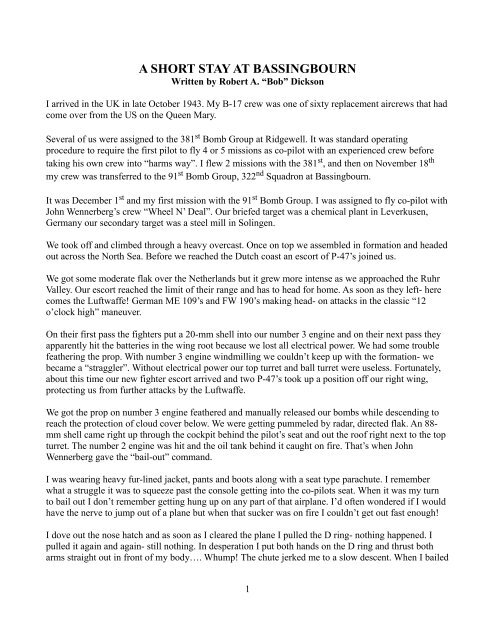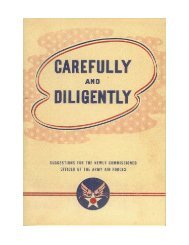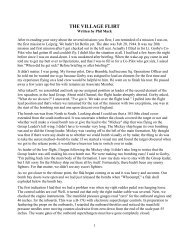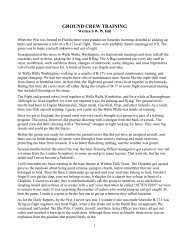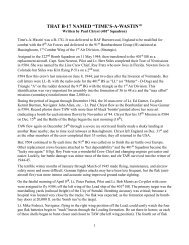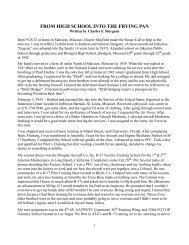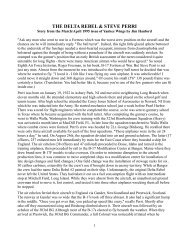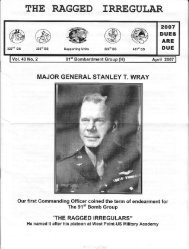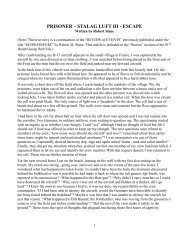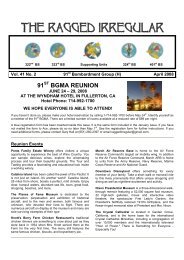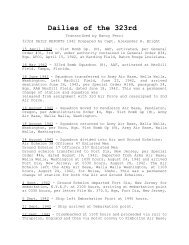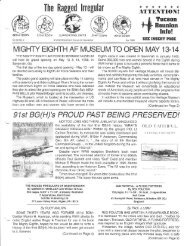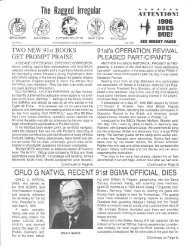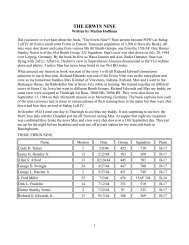A SHORT STAY AT BASSINGBOURN - the 91st Bomb Group!
A SHORT STAY AT BASSINGBOURN - the 91st Bomb Group!
A SHORT STAY AT BASSINGBOURN - the 91st Bomb Group!
You also want an ePaper? Increase the reach of your titles
YUMPU automatically turns print PDFs into web optimized ePapers that Google loves.
A <strong>SHORT</strong> <strong>STAY</strong> <strong>AT</strong> <strong>BASSINGBOURN</strong><br />
Written by Robert A. “Bob” Dickson<br />
I arrived in <strong>the</strong> UK in late October 1943. My B-17 crew was one of sixty replacement aircrews that had<br />
come over from <strong>the</strong> US on <strong>the</strong> Queen Mary.<br />
Several of us were assigned to <strong>the</strong> 381 st <strong>Bomb</strong> <strong>Group</strong> at Ridgewell. It was standard operating<br />
procedure to require <strong>the</strong> first pilot to fly 4 or 5 missions as co-pilot with an experienced crew before<br />
taking his own crew into “harms way”. I flew 2 missions with <strong>the</strong> 381 st , and <strong>the</strong>n on November 18 th<br />
my crew was transferred to <strong>the</strong> 91 st <strong>Bomb</strong> <strong>Group</strong>, 322 nd Squadron at Bassingbourn.<br />
It was December 1 st and my first mission with <strong>the</strong> 91 st <strong>Bomb</strong> <strong>Group</strong>. I was assigned to fly co-pilot with<br />
John Wennerberg’s crew “Wheel N’ Deal”. Our briefed target was a chemical plant in Leverkusen,<br />
Germany our secondary target was a steel mill in Solingen.<br />
We took off and climbed through a heavy overcast. Once on top we assembled in formation and headed<br />
out across <strong>the</strong> North Sea. Before we reached <strong>the</strong> Dutch coast an escort of P-47’s joined us.<br />
We got some moderate flak over <strong>the</strong> Ne<strong>the</strong>rlands but it grew more intense as we approached <strong>the</strong> Ruhr<br />
Valley. Our escort reached <strong>the</strong> limit of <strong>the</strong>ir range and has to head for home. As soon as <strong>the</strong>y left- here<br />
comes <strong>the</strong> Luftwaffe! German ME 109’s and FW 190’s making head- on attacks in <strong>the</strong> classic “12<br />
o’clock high” maneuver.<br />
On <strong>the</strong>ir first pass <strong>the</strong> fighters put a 20-mm shell into our number 3 engine and on <strong>the</strong>ir next pass <strong>the</strong>y<br />
apparently hit <strong>the</strong> batteries in <strong>the</strong> wing root because we lost all electrical power. We had some trouble<br />
fea<strong>the</strong>ring <strong>the</strong> prop. With number 3 engine windmilling we couldn’t keep up with <strong>the</strong> formation- we<br />
became a “straggler”. Without electrical power our top turret and ball turret were useless. Fortunately,<br />
about this time our new fighter escort arrived and two P-47’s took up a position off our right wing,<br />
protecting us from fur<strong>the</strong>r attacks by <strong>the</strong> Luftwaffe.<br />
We got <strong>the</strong> prop on number 3 engine fea<strong>the</strong>red and manually released our bombs while descending to<br />
reach <strong>the</strong> protection of cloud cover below. We were getting pummeled by radar, directed flak. An 88mm<br />
shell came right up through <strong>the</strong> cockpit behind <strong>the</strong> pilot’s seat and out <strong>the</strong> roof right next to <strong>the</strong> top<br />
turret. The number 2 engine was hit and <strong>the</strong> oil tank behind it caught on fire. That’s when John<br />
Wennerberg gave <strong>the</strong> “bail-out” command.<br />
I was wearing heavy fur-lined jacket, pants and boots along with a seat type parachute. I remember<br />
what a struggle it was to squeeze past <strong>the</strong> console getting into <strong>the</strong> co-pilots seat. When it was my turn<br />
to bail out I don’t remember getting hung up on any part of that airplane. I’d often wondered if I would<br />
have <strong>the</strong> nerve to jump out of a plane but when that sucker was on fire I couldn’t get out fast enough!<br />
I dove out <strong>the</strong> nose hatch and as soon as I cleared <strong>the</strong> plane I pulled <strong>the</strong> D ring- nothing happened. I<br />
pulled it again and again- still nothing. In desperation I put both hands on <strong>the</strong> D ring and thrust both<br />
arms straight out in front of my body…. Whump! The chute jerked me to a slow descent. When I bailed<br />
1
out we were in <strong>the</strong> clouds at around 13,000 feet, when I finally got <strong>the</strong> chute open I had dropped out of<br />
<strong>the</strong> overcast and barely had a chance to look around before I was on <strong>the</strong> ground.<br />
It turns out that we were right over <strong>the</strong> city of Düsseldorf when we left <strong>the</strong> plane. We were captured<br />
immediately. Nine of us got out. Sadly, or tail gunner, Sgt. William E. Roller, was killed by flak and<br />
went down with <strong>the</strong> plane- it crashed into <strong>the</strong> Rhine River.<br />
I landed in a plowed field in <strong>the</strong> city of Nuess just across <strong>the</strong> river from Düsseldorf. An older man,<br />
probably a WWI veteran, was <strong>the</strong>re with a Mauser rifle gesturing for me to put my hands up. There was<br />
a gusty wind blowing and every time I lowered my hands to try and deflate <strong>the</strong> canopy this guy would<br />
make a menacing gesture with his rifle. The wind carried me a couple of hundred feet, slamming me<br />
into a fence, damaging my ribs. Finally <strong>the</strong> guy realized my dilemma and allowed me to remove my<br />
chute. We stood <strong>the</strong>re about 100 feet apart- he with his rifle aimed at my head and me with my hands<br />
up in surrender. Soon a motorcycle with a sidecar came charging up. There were two Luftwaffe<br />
sergeants aboard. They put me in <strong>the</strong> sidecar and took me to <strong>the</strong>ir headquarters a short distance away.<br />
They informed me that we were at an anti-aircraft battery that had been firing at us just a short time<br />
earlier. One of <strong>the</strong>m, using gestures and some broken English, let me know he intended to send my<br />
parachute canopy to his wife who would use it to make herself some lingerie. Here I heard <strong>the</strong> phrase<br />
that I was to hear many times in <strong>the</strong> next few days “fur you da var is offar” (for you <strong>the</strong> war is over).<br />
Within a few hours I was taken to an airbase outside of Düsseldorf and put in a jail cell. The next<br />
morning I found that <strong>the</strong> rest of our crew was in adjacent cells. This was <strong>the</strong> first time we’d seen each<br />
o<strong>the</strong>r since we bailed out. The train took us to <strong>the</strong> Luftwaffe interrogation center at Oberursel just<br />
outside of Frankfurt. After a couple of days of solitary confinement and several interrogation sessions I<br />
was transferred sessions I was transferred to Dulag Luft, a transient camp in nearby Wetzlar.<br />
Again, our crew was re-united but we were cautioned not to discuss our recent experience since <strong>the</strong><br />
rooms were probably bugged. We were given a toothbrush and a cake of soap. Since <strong>the</strong> Germans had<br />
confiscated my fur-lined flying clo<strong>the</strong>s, I was issued a RAF greatcoat that was a few sizes too big for<br />
me but it kept me warm. The next day <strong>the</strong>y separated <strong>the</strong> officers from <strong>the</strong> enlisted men and sent us off<br />
to our respective permanent camps.<br />
The Germans didn’t tell us where we were going; <strong>the</strong>y just loaded us into a boxcar and locked <strong>the</strong> door.<br />
The car was converted cattle car with bench-type seating. It was cold and drafty. After two and a half<br />
days we arrived at Barth, Pomerania, a small city near <strong>the</strong> coast of <strong>the</strong> Baltic Sea. From <strong>the</strong> train station<br />
it was a 2-mile march to Stalag Luft 1, a permanent prison camp run by <strong>the</strong> Luftwaffe for POW allied<br />
airman, mostly officers.<br />
I spent 18 months in Stalag Luft 1. There were 16 of us crowded into a room that according to <strong>the</strong><br />
terms of <strong>the</strong> Geneva Convention should house only 8. The room had a stove fueled by charcoal<br />
briquettes that provided heat as well as a cooking surface. We had to prepare our own meals. The<br />
Germans gave us staples such as potatoes, rutabagas, cooked barley and heavy brown bread. The good<br />
stuff came in <strong>the</strong> form of Red Cross food parcels; <strong>the</strong>y had ei<strong>the</strong>r a can of Spam or corned beef,<br />
powdered milk, margarine, or a chocolate bar and cigarettes.<br />
Camp life was boring! It wasn’t like “Hogan’s Heroes”. We did have a library with a limited number of<br />
books- <strong>the</strong> good were always out. Through <strong>the</strong> efforts of <strong>the</strong> Red Cross and <strong>the</strong> YMCA we had some<br />
athletic equipment and a few musical instruments. We were able to put toge<strong>the</strong>r a band and some guys<br />
2
got toge<strong>the</strong>r to put on a few shows in a makeshift <strong>the</strong>ater.<br />
It was a cold, damp place most of <strong>the</strong> year. Often we were standing out in <strong>the</strong> cold rain for <strong>the</strong> twice a<br />
day head count. After dark we were locked in our barracks with <strong>the</strong> windows shuttered. In <strong>the</strong> last few<br />
months of <strong>the</strong> war <strong>the</strong> Red Cross food parcels stopped coming and at <strong>the</strong> same time <strong>the</strong> Germans cut<br />
back on our rations. When our senior officers complained, <strong>the</strong> standard reply was “if your fighters<br />
would stop shooting up at our trains <strong>the</strong> supplies could get through!”<br />
Towards <strong>the</strong> end of April 1945 we could hear artillery gunfire from <strong>the</strong> Russian Army advancing from<br />
<strong>the</strong> east. On <strong>the</strong> night of April 30 th all <strong>the</strong> Germans left <strong>the</strong> camp, heading west hoping to surrender to<br />
British troops. On May 1 st we took over <strong>the</strong> camp. Fortunately our Senior Allied Officer, Colonel Hub<br />
Zemke, had planned for this day by setting up an organization of MP’s, translators, and Kriegies with<br />
various talents needed to run <strong>the</strong> camp now that <strong>the</strong> Germans had fled. The Russian Army overran <strong>the</strong><br />
surrounding area, Contact was made with <strong>the</strong> Russians and after two weeks of top-level negotiations,<br />
B-17’s were allowed to land at a nearby airfield and fly us out to France. A B-17 never looked so good!<br />
________________________________________________________________________________________<br />
Col. Hubert “Hub” Zemke<br />
As October drew to a close and his combat hours passed 450, Zemke knew his days as a group commander were about to end. He was<br />
ordered to 65th Fighter Wing headquarters as a chief of staff. With his bags packed, he decided to fly one more mission before taking over<br />
a desk.<br />
On that mission he ran into <strong>the</strong> worst turbulence he had ever encountered. He ordered his formation to turn back, but before he could do<br />
so, his P-51 lost a wing. Parachuting from <strong>the</strong> wreckage, Zemke was soon taken prisoner ended up in Stalag Luft 1 at Barth, Germany, on<br />
<strong>the</strong> Baltic Sea.<br />
Newly arrived, Colonel Zemke found himself senior officer in command of 7,000 Allied prisoners, some of whom had been <strong>the</strong>re several<br />
years. Conditions were deplorable: insufficient food, inadequate clothing and medical attention, a lack of military discipline among some<br />
POWs, and indifferent or hostile German officials.<br />
Zemke quickly established his leadership of <strong>the</strong> POWs, who numbered about 9,000 by V-E Day. Gradually he developed working<br />
relations with <strong>the</strong> prison commandant and staff and achieved some improvements in living conditions.<br />
As it became apparent that <strong>the</strong>ir war was lost, <strong>the</strong> Germans became more cooperative, especially as Soviet armies approached from <strong>the</strong><br />
east. Zemke and his staff negotiated an agreement with <strong>the</strong> camp commandant for <strong>the</strong> Germans to depart quietly at night, bearing only<br />
small arms, and turn <strong>the</strong> camp over to <strong>the</strong> Allied POW wing.<br />
To avoid conflict with some POWs and <strong>the</strong> hated guards, Zemke’s staff kept <strong>the</strong> arrangement secret until <strong>the</strong> morning after <strong>the</strong> German<br />
departure. Zemke <strong>the</strong>n nurtured friendly relations with <strong>the</strong> arriving Soviets. (In 1941, he had spent several months in <strong>the</strong> USSR teaching<br />
Russian pilots to fly <strong>the</strong> P-40. He spoke some Russian and fluent German.) Ultimately, Zemke arranged for <strong>the</strong> POWs to be flown to<br />
allied territory. His strong leadership saved <strong>the</strong> lives of many POWs.<br />
Col. Hub Zemke retired form <strong>the</strong> Air Force in 1966 and died August 30, 1994, at Oroville, Calif. He was an extraordinary man,<br />
outspoken, courageous, and of unflagging personal integrity and conviction. These qualities, which made him one of our greatest wartime<br />
leaders, did not endear him to some of his military superiors and probably denied <strong>the</strong> rank and responsibilities he deserved. Never<strong>the</strong>less,<br />
he will remain a symbol of military excellence long after o<strong>the</strong>rs are forgotten.<br />
- - - - - - - - - -<br />
THE ABOVE STORY IS THE PROPERTY OF THE AUTHOR AND MAY NOT BE REPRODUCED WITHOUT THE AUTHOR'S CONSENT<br />
www.<strong>91st</strong>bombgroup.com<br />
3


